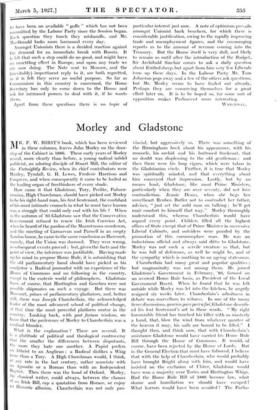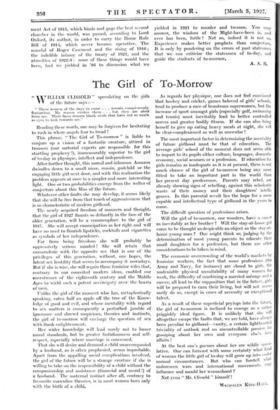Morley and Gladstone
MR. F. W. HIRST'S book, which has been reviewed in these columns, leaves John Morley on the door- step of the Cabinet in 1886. These early years of Morley reveal, more clearly than before, a young radical infidel publicist, an adoring disciple of Stuart Mill, the editor of the Fortnightly Review, when its Chief contributors were Huxley, Tyndall, G. H. Lewes, .Frederic Harrison. and Congreve, and when consequently it came to be hailed as the leading organ of freethinkers of every shade.
How came it that Gladstone, Tory, Peefite, Palmer- stonian, High Churchman, should have picked out Morley to be his right-hand man, his first lieutenant, the confidant of his most intimate counsels in what he must have known was a struggle that could only end with his life ? When in the autumn of '85 Gladstone saw that the Conservative Covernment refused to renew the Irish Coercion Act, when he heard of the pardon of the Maamtrasna murderers, and the meeting of Carnarvon and Parnell in an empty London house, he came to the same conclusion as Harcourt, namely, that the Union was doomed. They were wrong, as subsequent events proved ; but, given the facts and the point of view, the inference was justifiable. Having made up his mind to propose Home Rule, it is astonishing that the old parliamentarY hand shoUld have picked as his coadjutor a Radical journalist with no experience of the House of Commons. and no following in the country, except in the esoteric world of philosophers. Gladstone knew, of course, that Hartington and Goschen were not Possible shipmates on such a Voyage. But there was Harcourt, prince of parliamentary gladiators, and, better still, there was Joseph Chamberlain, the acknowledged leader of the most advanced school of political change, at that time the most powerful platform orator in the Country. Looking back, with post factunt wisdom, we know that the preference of Morley to Chamberlain was a cardinal blunder.
What is the explanation ? There are several. It 1, a platitude of political and theological controversy that the smaller the differences between disputants, the more they hate one another. A Papist prefers an Atheist to an Anglican ; a Radical dislikes a Whig More than a Tory. A High Churchman would, I think, at anY rate in the last century, rather associate with 411 Agnostic or a Roman than with an Independent baptist. Then there was the bond of Oxford. Morley, the classical writer, could always, between the clauses of an Irish Bill, cap a quotation from Horace, or enjoy an Homeric allusion. Chamberlain was not only pro- vincial, but aggressively so., There was something of the Birmingham buck about his appearance, with his monocle, his orchid and his buttoned frockcoat, that no doubt was displeasing to the old gentleman : and then there were his long cigars, which were taboo in the.Gladstonian circle. Further, it is true that Morley was spiritually minded, and that everything about hint conveyed that impression. Lastly, but by no means least, Gladstone, like most Prime Ministers, particularly when they are over seventy, did not love contradiction. Jeanie Deans, when she begs her sweetheart Reuben Butler not to contradict her father, advises, " just set the auld man on talking ; he'll get mair comfort to himself that way." Morley thoroughly understood this, whereas Chamberlain would have argued every point. Childers filled all the highest offices of State except that of Prime Minister in successive Liberal Cabinets, and outsiders were puzzled by the promotion of this commonplace man. He was an industrious official and always said ditto to Gladstone. Morley was not such a servile creature as that, but lie was full of deference, as well he might be, and of the sympathy which is soothing to an ageing statesman.
Chamberlain had many great and popular qualities ; but magnanimity was not among them. He joined Gladstone's Government in February, '86, formed on an avowed Home Rule basis, as President of the Local Government Board. When he found that he was left outside while Morley was let into the kitchen, he angrily resigned six weeks later. Chamberlain's adroitness in debate was marvellous to witness. In one of the many fierce discussions, quorum pars pa rvafui, Gladstone describ- ed his lost lieutenant's art in these words. " My right honourable friend has touched his tiller with so masterly a hand, that, blow the wind from whatever quarter of the heaven it may, his sails are hound to be filled." I thought then, and think now, that with Chamberlain's assistance Gladstone would have carried his Home Rule Bill through the House of Commons. It would, of course, have been rejected by the house of Lords. But in the General Election that must have followed, I believe that with the help of Chamberlain, who would probably have brought Bright along with him, and would have insisted on the exclusion of Ulster, Gladstone would have won a majority over Tories and Hartington Whigs. Had the Home Rule Bill of 1886 become law, what shame and humiliation we should have escaped ! What horrors would have been avoided ! Thc Parlia- ment Act of 1911, which binds and gags the best second chamber in the world, was passed, according to Lord Oxford, its author, in order to carry the Home Rule Bill of 1914, which never became operative. The scandal of Roger Casement and the rising of 1916 ; the indelible infamy of the treaty of 1921, and the atrocities of 1922-3: none of these things would have been, had we yielded in '86 to discussion what we yielded in 1921 to murder and treason. You may answer, the wisdom of the Might-have-been is, and ever has been, futile ! Not so, indeed it is not so. Experience makes better prophets than conjecture, It is only by pondering on the errors of past statesmen that we can criticize the statesmen of to-day, and guide the students of to-morrow.
A. A. B.































































 Previous page
Previous page